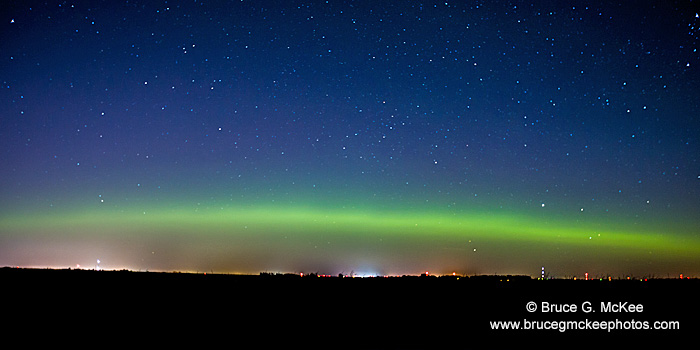Seeing the Northern Lights or Aurora Borealis in North Iowa is not a common event, but it is so sweet when we do get to see them. I won't go in to all of the details of what causes the auroras, (you can do your own research) except to say that accurate predictions of more than about 45 minutes are difficult. There are numerous Aurora Alerts web sites, Twitter feeds and Facebook pages where you can get alerts and notices of Aurora activity. Of course it needs to be dark and few or no clouds to the north. If there is a bright Moon it can wash out out the sky and make event bright Northern Lights difficult to see.
As you look at the charts and graphs on the web sites there are a few things that you need to know to determine if the lights are a possibility in your area.
A 'Kp index' of 6 (G2) or higher is usually necessary for North Iowa.
On the Bz chart a negative number or 'South' is a good thing. -3 is better than -2.
Watch for indicators that it is possible to see Aurora at middle latitudes.
Many sites display the time zone as UTC or UT for Universal Time. At this time of year Iowa is -5 UT. So 05:00UT or 5:00 AM would be Midnight here in Central Daylight time (CDT). 02:00UT would be 9:00 PM the previous day. When we are no longer on daylight savings time (CST) Iowa will be -6UT.
A few Aurora Alerts Web Sites:
- Aurora Forecast
- Softserve News Aurora Forecast
- Space Weather Live
- Aurora Alerts - Facebook site
- Great Lakes Aurora Hunters FB Group (request to join)
- Aurora Alerts on Twitter
- KP Aurora Alerts on Twitter
- Long list of Aurora Alerts sites
Photographing the Aurora:
Put the camera on a sturdy tripod. Full manual settings - manual focus on the lens focused on infinity or a very distant object, manual exposure. ISO from 400-3200 depending on how bright the lights, f/stop 2.8 or wider if your lens will allow, exposure time will vary from a few to several seconds. You'll have to experiment. Every night will be different. Sometimes they are barely visible to the naked eye, and can only be seen well in the camera with a longer time exposure. On rare occasions they are bright enough to shoot a video. If you see Northern Lights don't expect them to last long. They could last only a few minutes or several hours. There is no way to know. Or they could start and stop multiple times during the night or in to the early morning.
Good Luck. I hope that you get to see and photograph the Northern Lights!
- by Bruce McKee

 RSS Feed
RSS Feed
